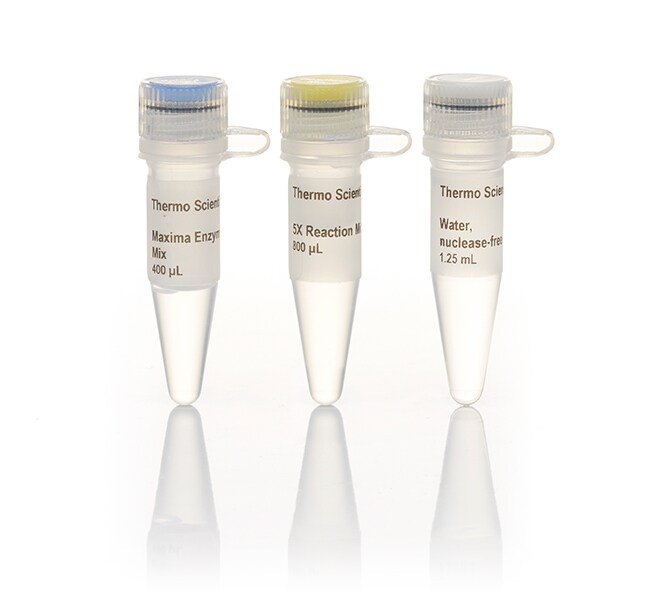Search Thermo Fisher Scientific

Maxima First Strand cDNA Synthesis Kit for RT-qPCR
| 카탈로그 번호 | 포함 | 반응 수 |
|---|---|---|
| K1642 | Kit only | 200 Reactions |
| K1641 | Kit only | 50 Reactions |
| K1671 | Kit with dsDNase | 50 Reactions |
| K1672 | Kit with dsDNase | 200 Reactions |
The Thermo Scientific Maxima First Strand cDNA Synthesis Kit for RT-qPCR, available with or without dsDNase, is a convenient system optimized for cDNA synthesis in two-step quantitative RT-PCR (RT-qPCR) applications. It provides a dramatically simplified workflow that combines genomic DNA elimination and cDNA synthesis into one-tube procedure. These cDNA Synthesis kits use Maxima Reverse Transcriptase (RT), an advanced enzyme derived by in vitro evolution of M-MuLV RT. The enzyme features high thermostability, robustness and increased cDNA synthesis rate compared to wild type M-MuLV RT.
The Maxima First Strand cDNA Synthesis Kit for RT-qPCR is capable of reproducible cDNA synthesis from a wide range of total RNA amounts (1 pg to 5 μg) at elevated temperatures (42–65°C). The synthesis reaction can be completed in 15–30 minutes. Components of the Maxima First Strand cDNA Synthesis Kit for RT-qPCR are pre-mixed to save time and to reduce the possibility of pipetting errors.
The Maxima First Strand cDNA Synthesis Kit for RT-qPCR with dsDNase also contains a novel double-strand specific DNase engineered to remove contaminating genomic DNA from RNA preps in two minutes without damage to quality or quantity of RNA. Highly specific activity towards double-stranded DNA ensures that single-stranded DNA (such as cDNA and primers) is not cleaved and dsDNase treated RNA can be directly added to reverse transcription.
Features of the Maxima First Strand cDNA Synthesis Kit for RT-qPCR include:
- High yields of full length cDNA up to 20 kb
- Efficient cDNA synthesis at wide temperature range (42–65°C)
- Increased synthesis rate—complete cDNA synthesis in 15–30 minutes
- High sensitivity and specificity
- Integrated gDNA removal step with dsDNase kit
Maxima First Strand cDNA Synthesis Kit with dsDNase contains:
- Maxima Enzyme Mix
- 5X Reaction Mix
- nuclease-free water
Kit with dsDNase also contains
- dsDNase
- 10X dsDNase Buffer
Applications
- 2-step RT-PCR
- 2-step RT-qPCR
Additional information about reaction components
The Maxima Enzyme Mix contains Maxima Reverse Transcriptase and RiboLock RNase Inhibitor. The recombinant RiboLock RNase Inhibitor effectively protects RNA templates from degradation by RNases A, B, and C at temperatures up to 55°C.
5X Reaction Mix contains the remaining reaction components: reaction buffer, dNTPs, oligo(dT)18 and random hexamer primers. Nuclease-free water is provided for reaction set-up and dilution of sample RNA.
The absence of endo- and exo-deoxyribonucleases, ribonucleases, and phosphatases has been confirmed by appropriate quality tests.
• Maxima Enzyme Mix
• 5X Reaction Mix
• Nuclease-free water
Store at –20°C.
그림





Customers who viewed this item also viewed
문서 및 다운로드
Certificates | 증명서
Safety Data Sheets | 물질 안전 보건 자료
자주 묻는 질문(FAQ)
It is generally beneficial to minimize RNase H activity when aiming to produce long transcripts for cDNA cloning. RNase H degrades RNA from RNA-DNA duplexes, which can result in truncated cDNA during reverse transcription of long mRNA. It is also recommended to use RNase H-minus RTs for template-independent addition of C nucleotides. In contrast, reverse transcriptases with intrinsic RNase H activity are often favored in qPCR applications.
All Thermo Scientific reverse transcriptases possess intrinsic TdT activity although at varying degrees depending upon the reaction conditions. For addition of template-independent C nucleotides (as for SMART and RACE experiments), this specific TdT activity can be induced by Mn2+. We would recommend Maxima H- or RevertAid H- minus RTs for this purpose.
cDNA synthesis at higher temperatures ensures successful transcription of RNA with high levels of secondary structure, reducing issues of primer access to template. Therefore, we do recommend to use RT enzymes with high thermostability, e.g. Maxima and Maxima H Minus Reverse Transcriptases, which provide higher yields of full-length cDNA, better sensitivity, and successful transcription of GC-rich templates.
Trace amounts of reagents used in RNA purification protocols may remain in solution and inhibit first-strand synthesis, e.g., SDS, EDTA, guanidine salts, phosphate, pyrophosphate, polyamines, spermidine. To remove trace contaminants, we recommend re-precipitating the RNA with ethanol and washing the pellet with 75% ethanol, or re-purifying the RNA.
RNA purity and integrity are essential for synthesis and quantification of cDNA. Always assess the integrity of RNA prior to cDNA synthesis. Use freshly prepared RNA. Multiple freeze/thaw cycles of the RNA sample and synthesized cDNA is not recommended. Avoid RNase contamination and discard low quality RNA.